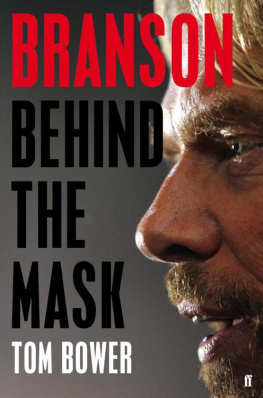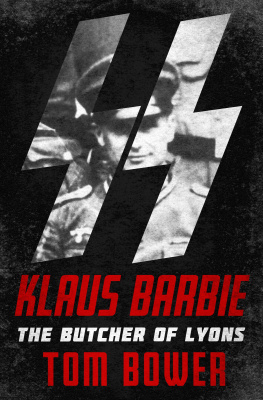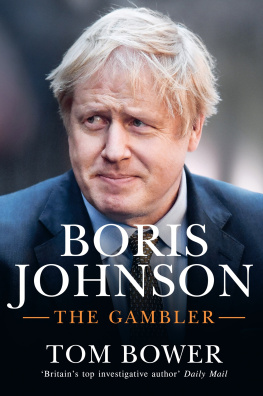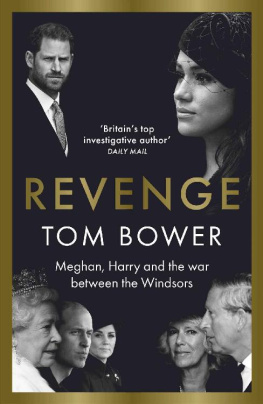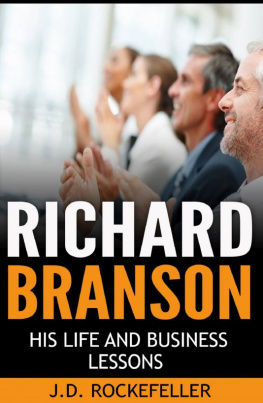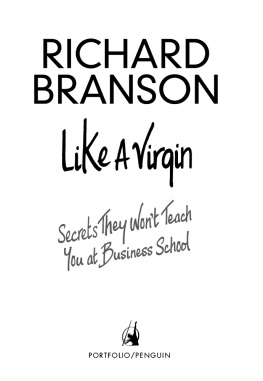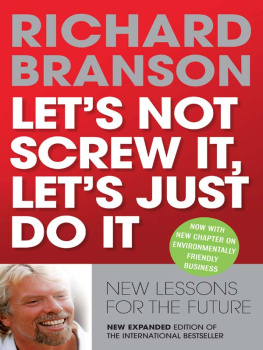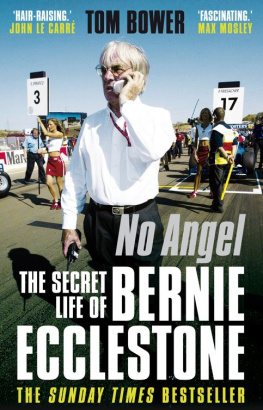Introduction
The British love chancers. Tilting on the edge, they entertain the public by breaking rules, escaping blame and feeding gossip. Rich or poor, these rare personalities fascinate and excite. Few are more popular in Britain than Richard Branson. Celebrated as the nations most successful buccaneer, Branson once attracted more Twitter followers than President Obama, and nearly as many fans as David Beckham. Over the past forty-five years, his colourful exploits have earned him adoration as an English rebel entitled to his wealth. He is a self-made and self-deprecating man whose flamboyance endears him to aspiring tycoons, who snap up his books and flock to his lectures to glean the secrets of fortune-hunting. He is an entrepreneur idolised and lauded as a hero by ambitious young men and women.
For others, Richard Branson is a scoundrel, a card player with a weak hand who plays to strength. Those who come off second best scorn the showman as a one-dimensional poseur who manipulates Virgins image through a wily media machine. For them, the mystery surrounding Bransons businesses and wealth has grown over the past decade, but their criticisms remain ill defined. Bransons contradictions are glaring but confused by a smokescreen.
Just how a school drop-out became a billionaire has become the stuff of legend, repeatedly recounted by Branson but more accurately described by others. His self-portrayal as the defiant tycoon risking danger has generated endless free publicity. His reward is global celebrity.
Inspiration, persistence and shrewdness have contributed to creating the Virgin empire. Plus, by Bransons own admission, breaking the rules. If I want to do something worthwhile, he wrote recently, or even just for fun, I wont let silly rules stop me. Without adequate shame, he has described cheating in his school exams, committing a tax fraud and lying to the police. Less publicised is his attitude towards maximising his wealth.
As far as I am concerned, wrote the exhibitionist, [I] would do anything, however outlandish, that generates media coverage and reinforces my image as a risk taker who challenges the government. Sex, he continued, was one way to promote Virgins image. Over the years, Branson has never complained if he is painted as a philanderer. He has even publicly speculated about his son losing his virginity to a well-known singer. In his breathless quest for publicity, he has recycled unprovable stories, including the assertion that a senior French politician asked for a bribe of 1 million in exchange for permission to open the Virgin Megastore on the Champs-lyses on Sundays. Bransons colourful memories are rarely challenged. Over the decades, the cheers have grown and the doubts have subsided. The mystery is whether his business is still worth billions of pounds; the controversy is whether he deserves accolades for being Britains most successful businessman.
Around 2011, the then sixty-one-year-old reached a crossroads. At the climax of a seven-year journey, he renounced raw capitalism. Branson had converted to green politics tinged with populist socialism. Virgin, he said, was set to undertake a sea change on a journey to transform itself into a force for good for people and the planet. Some speculated that Branson had experienced a hormonal change, while others assumed he was plucking at another opportunity, but insiders recognised that Virgin required rebranding.
My message, he wrote, is a simple one: business as usual isnt working. In fact its business as usual thats wrecking our planet. We must change the way we do business. Capitalism, Branson believed, had lost its way a bit. The short-term focus on profit has driven most businesses to forget about the long-term role they have in taking care of people and the planet. His transformation into the caring peoples champion of the environment and its population was not pure altruism. Green, the billionaire realised, was a money-making opportunity. To recapture Virgins appeal, he was reinventing his corporation as a benevolent profiteer blessed with a social conscience.
The 2008 economic crash had damaged Virgin. Although outsiders regarded the empire, ranging over trains, health and finance, as resplendent, his airlines had suffered a financial crisis. The sum of his disparate investments no longer added up to the billions certified by the rich lists published in the SundayTimes and Forbes. In his secretive world, the financial reality had been concealed. Among his problems was the brands fading appeal to the youth market. Virgins attraction was increasingly confined to an ageing generation sceptical of new ideas. In the inevitable momentum either becoming bigger and more visionary, or smaller and parochial Virgin no longer offered innovation. Branson presented his personal dilemma as a social and environmental crisis that challenged all financial and political leaders. While business has been a great vehicle for growth in the world, he wrote, neither Virgin nor many other businesses have been doing anywhere near enough to stop the downward spiral we all find ourselves in.
The tycoon offered a solution, summarising his new philosophy in a book, ScrewBusinessasUsual, published in 2011. He challenged those who werent afraid to follow the titles standpoint to show they meant it. His message to corporations was subversive: Profit is no longer the only driving force. Instead, he argued, corporations should be doing good for humanity and the environment Business needs a heart. In the past, business has been all about making money, which is fine, but it hasnt been about being a responsible citizen.
His criticism of profits was matched by a condemnation of environmental vandalism: Resources are being used up: the air, the sea, the land are all heavily polluted. The poor are getting poorer. Many are dying of starvation or because they cant afford a dollar a day for life-saving medication. We have to fix it and fast. Even disbelievers, he said, admit that people everywhere are mucking up things.
His best-selling book, a catalogue of Virgins good deeds and famous names, placed Branson on a pedestal: We must change the way we do business. Do good and the rewards will come. Part of the cure, he wrote, was to eliminate a false dilemma from business talk. It is becoming more and more clear that there is no incompatibility between doing business in an ethical and transparent manner and achieving good financial results.
His appeal for transparency was written on Necker, his sun-kissed Caribbean island, which he bought for 180,000 in 1978 and which he was to use as his tax haven. Throughout his career, Branson has sought to avoid taxes: first illegally in a purchase-tax fraud, and later legitimately by carefully structured corporate pyramids, which ultimately led to his permanent move to the Virgin Islands as a tax exile from Britain after 2006.
In the opening pages of his book, Branson anticipated the day when No governments or businesses will be able to hide behind secrecy and jargon any longer. Indeed, he urged his readers to appreciate the transparency of his own conduct. In his relations with business and the public, he wrote, If youre open and honest with them and if they know there are no secrets, then they trust the brand.
His advocacy of ethical transparency is shared by campaigners for a fairer world. His obedience to his own sermon can be judged by the ownership of his flagship airline, which runs through eleven companies. Virgin Atlantic Airways (GB) is owned by Virgin Travel Group (GB), which in turn is owned by Virgin Atlantic (GB), which is owned by Bluebottle Investments (UK) Ltd (GB), which is owned by Bluebottle UK Ltd (GB), which is owned by Virgin Holdings Ltd (GB), which is owned by Classboss Ltd (GB), which is owned by Virgin Wings Ltd (GB), which is owned by Bluebottle USA Mobile Inc. (BVI), which is owned by Virgin Group Investments Ltd (BVI), which is finally owned by Virgin Group Holdings Ltd (BVI).

